- About
- Network
- Research Initiatives
- Big Data Initiative
- Chicago Experiments Initiative
- Health Economics Initiative
- Industrial Organization Initiative
- International Economics and Economic Geography Initiative
- Macroeconomic Research Initiative
- Political Economics Initiative
- Price Theory Initiative
- Public Economics Initiative
- Ronzetti Initiative for the Study of Labor Markets
- Socioeconomic Inequalities Initiative
- Research Initiatives
- Scholars
- Research
- Boosting Young Children’s Math Skill with Technology in the Home EnvironmentDaniela Bresciani Andaluz, Ariel Kalil, Haoxuan Liu, Susan E. Mayer, and Rohen ShahA Digital Library for Parent-Child Shared Reading Improves Literacy Skills for Young Disadvantaged ChildrenAriel Kalil, Haoxuan Liu, Susan Mayer, Derek Rury, and Rohen ShahPriming Parental Identity: Evidence from Experimental DataDaniela Bresciani, Ariel Kalil, Haoxuan Liu, and Susan Mayer
- Events
Upcoming Events
- Insights
BFI Videos
BFI Youtube Channel
- News










